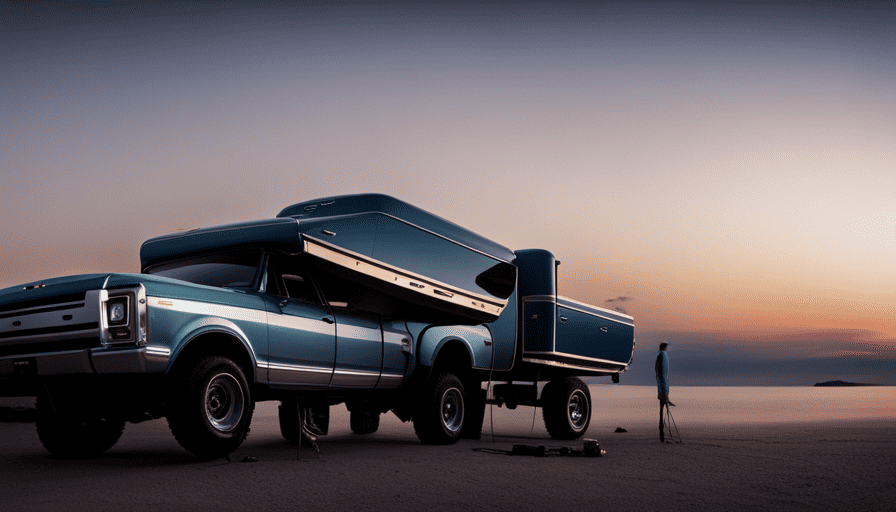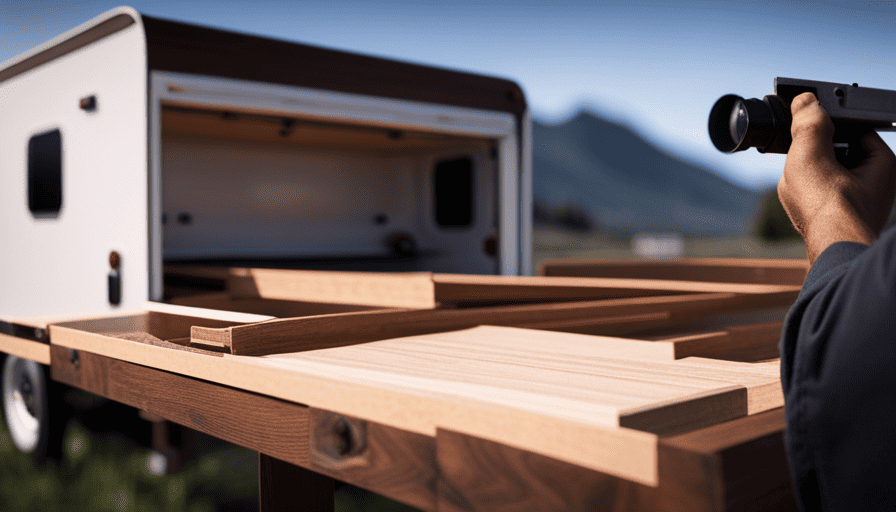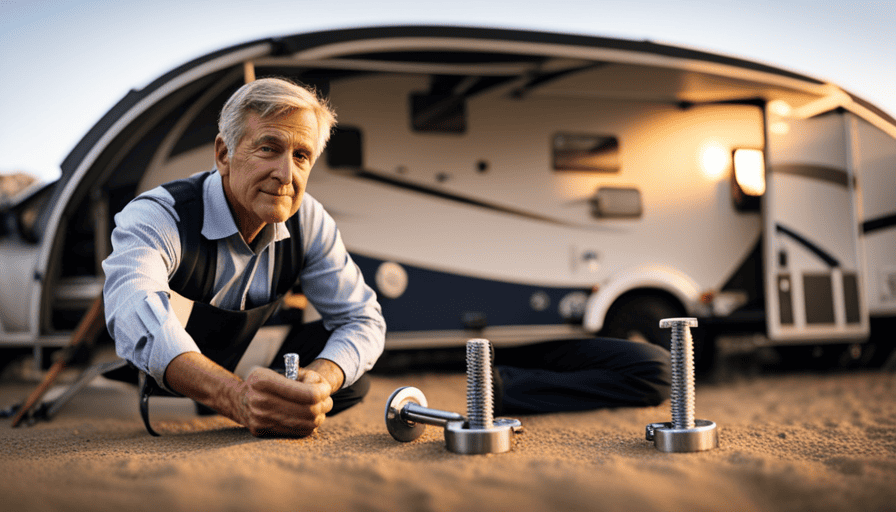Have you ever pondered the weight of a camper shell?
Well, get ready to be amazed because camper shells can weigh as much as a ton of bricks! Okay, maybe not literally, but they can definitely add some serious weight to your vehicle.
In this article, I will be diving deep into the world of camper shells, exploring the different types, sizes, and factors that influence their weight.
I will also be discussing lightweight options for those looking to minimize the impact on their vehicle’s carrying capacity.
Additionally, we will explore how the weight of a camper shell can affect fuel efficiency and provide some handy tips for handling and installing these behemoths.
So, if you’re ready to learn all there is to know about camper shell weight, buckle up and let’s get started!
Key Takeaways
- Camper shells can weigh as much as a ton of bricks, but typically weigh around 200-400 pounds.
- Camper shells are made from fiberglass or aluminum, with fiberglass offering better insulation and durability, but being heavier, while aluminum is lighter and easier to handle.
- The weight of a camper shell depends on the materials used and the size, with factors such as design, construction, and accessories also influencing the weight.
- The weight of a camper shell can affect a vehicle’s fuel efficiency, decreasing gas mileage by up to 25%, so it’s important to consider the impact on fuel consumption when choosing a camper shell.
Understanding the Basics of Camper Shells
A camper shell is typically quite heavy, weighing in at around 200-400 pounds, making it important to consider the weight when installing or removing it from a vehicle.
When it comes to camper shell materials, they are commonly made from either fiberglass or aluminum. Fiberglass shells tend to be heavier, but they offer better insulation and are more durable. On the other hand, aluminum shells are lighter, making them easier to handle, but they may not provide as much insulation and can dent more easily.
There are several pros to having a camper shell. Firstly, it provides extra storage space for camping gear, tools, or any other items you may need on your journey. Additionally, it can protect your belongings from the elements, keeping them dry and secure. It also allows you to have a comfortable sleeping area while on the road, making it a great option for camping enthusiasts. However, there are some cons to consider as well. The extra weight can affect your vehicle’s fuel efficiency, and the installation process can be time-consuming and requires some physical effort.
Moving on to the next section about different types and sizes of camper shells, it’s important to understand the various options available to find the perfect fit for your vehicle.
Different Types and Sizes of Camper Shells
There’s quite a range in the sizes and weights of these convenient travel companions. Camper shells come in various types and sizes to suit different needs and preferences. When it comes to camper shell weight, it largely depends on the materials used and the size of the shell.
Camper shells can be made from different materials such as fiberglass, aluminum, or even carbon fiber. Fiberglass shells are popular for their durability and lightweight nature. They’re relatively lighter compared to aluminum shells, which tend to be heavier but also more durable. Carbon fiber shells, on the other hand, are the lightest but also the most expensive option.
In terms of size, camper shells range from compact shells designed for small trucks to larger shells that can accommodate full-size trucks. The weight of the shell increases with its size, as more materials are required to build larger shells.
When considering a camper shell, it’s important to consider the material used and the size that best fits your truck. These factors will not only affect the weight of the shell but also its cost.
Factors that influence camper shell weight will be discussed in the next section.
Factors that Influence Camper Shell Weight
One key factor that affects how much a camper shell weighs is the type of material it’s made from. Different materials have different weights, and this can have a significant impact on the overall weight of the camper shell. Here are some factors that influence the weight of a camper shell:
-
Material: Camper shells can be made from a variety of materials such as aluminum, fiberglass, or steel. Aluminum is lightweight and durable, making it a popular choice. Fiberglass is also lightweight and offers good insulation, but it may be less durable than aluminum. Steel is heavier but provides exceptional strength and durability.
-
Design: The design of the camper shell can also affect its weight. Some designs may incorporate additional features such as windows, doors, or storage compartments, which can add to the weight.
-
Size: The size of the camper shell is another important factor. Larger shells will naturally weigh more than smaller ones.
-
Construction: The construction methods used can also impact the weight. Shells that are built with more reinforcement or thicker materials will be heavier.
-
Accessories: The addition of accessories such as roof racks, ladder racks, or lighting can also increase the weight of the camper shell.
Considering these factors is important as they not only affect the weight but also the durability and impact on vehicle handling. Lightweight camper shell options are available for those who prioritize weight reduction without sacrificing functionality or durability. These options will be discussed in the next section.
Lightweight Camper Shell Options
If you’re looking for a lighter alternative for your camping setup, consider exploring the world of lightweight camper shell options. These camper shells are designed using materials that are specifically chosen to reduce weight while still maintaining durability and functionality. By opting for a lightweight camper shell, you can enjoy the benefits of a lighter load on your vehicle, improved fuel efficiency, and easier handling on the road.
To give you a better idea of the materials used in lightweight camper shells, here’s a table showcasing some popular options:
| Material | Weight | Benefits |
|---|---|---|
| Fiberglass | Light | Excellent insulation |
| Aluminum | Lightweight | Corrosion-resistant |
| Carbon Fiber | Ultra-light | High strength-to-weight ratio |
| Composite | Lightweight | Durable and versatile |
As you can see, these materials offer a range of benefits, from insulation to corrosion resistance. Lightweight camper shells provide the opportunity to optimize your camping experience without compromising on quality. They allow you to carry more gear, maneuver easily, and save on fuel costs.
In the next section, we’ll delve into the standard weight range for camper shells, providing you with a comprehensive understanding of the various options available.
Standard Weight Range for Camper Shells
When it comes to camper shells, it’s fascinating to explore the standard weight range and discover the options available for a delightful camping experience.
Camper shells come in a variety of weights, and understanding this range can help you make an informed decision. Here are three important factors to consider when it comes to camper shell weight:
-
Size: Camper shells can vary in size, from compact options for smaller trucks to larger ones for full-size trucks. The size of the camper shell will affect its weight, with larger shells generally weighing more.
-
Material: Camper shells are typically made from materials such as fiberglass, aluminum, or steel. Each material has its own weight characteristics. Fiberglass shells are lightweight and offer good insulation, while aluminum shells are lightweight and durable. Steel shells are heavier but provide excellent strength and durability.
-
Design: The design of the camper shell can also impact its weight. Some shells may have additional features such as windows, storage compartments, or built-in racks, which can add to the overall weight.
Understanding the standard weight range of camper shells and considering factors such as size, material, and design can help you find the perfect fit for your camping needs.
In the next section, we’ll explore how to measure and calculate the weight of a camper shell without writing ‘step’.
How to Measure and Calculate Camper Shell Weight
To accurately determine the weight of your camper shell, all you have to do is whip out your trusty scale and give it a good ol’ weigh-in. This simple step will provide you with the most precise measurement.
When weighing your camper shell, it’s important to ensure measuring accuracy. Make sure the scale is on a flat, level surface and that the shell is positioned securely on top. Take note of the weight displayed on the scale, as this will give you an idea of how heavy your camper shell is.
In addition to measuring accuracy, it’s also important to consider weight distribution. The weight of the camper shell should be evenly distributed on the scale. This will help you understand how the weight is distributed across the shell and determine if any adjustments need to be made for proper balance.
Once you have determined the weight of your camper shell, you can then move on to considerations for carrying capacity and vehicle compatibility.
Considerations for Carrying Capacity and Vehicle Compatibility
Ensure that your vehicle has the appropriate carrying capacity and is compatible with the weight of the camper shell you’ve measured. It’s important to consider the carrying capacity limitations of your vehicle when choosing a camper shell. Each vehicle has a specific weight limit that it can safely carry, and exceeding this limit can lead to serious safety issues.
Additionally, vehicle compatibility factors should be taken into account. Some vehicles may have different designs or structures that may not be suitable for certain types of camper shells. For example, a smaller car may not be able to support the weight of a heavy camper shell, while a larger truck may be better equipped to handle the additional weight.
When considering the carrying capacity and vehicle compatibility, it’s also important to consider the impact of the camper shell weight on fuel efficiency. The additional weight of the camper shell can increase fuel consumption, as the engine has to work harder to move the vehicle. This can result in decreased fuel efficiency and higher fuel costs. Therefore, it’s important to find a balance between the weight of the camper shell and the fuel efficiency of your vehicle.
Transitioning into the next section, it’s crucial to understand the impact of camper shell weight on fuel efficiency.
Impact of Camper Shell Weight on Fuel Efficiency
Consider the significant effect that the weight of your camper shell can have on fuel efficiency, potentially resulting in a decrease in gas mileage by up to 25%. When it comes to fuel efficiency, every pound matters. The extra weight of a camper shell adds to the overall load that your vehicle needs to carry, which in turn requires more fuel to maintain the same level of performance.
The heavier the camper shell, the more fuel will be required to move it, leading to decreased fuel efficiency.
The impact of camper shell weight on fuel efficiency can vary depending on factors such as the size and design of the shell, as well as the make and model of your vehicle. For example, a smaller, lightweight camper shell will have less of an impact on fuel efficiency compared to a larger, heavier one. Additionally, vehicles with smaller engines or less towing capacity may be more affected by the extra weight.
To improve fuel efficiency while using a camper shell, consider opting for a lighter shell or removing unnecessary items from the shell to reduce weight. Regular maintenance, such as keeping tires properly inflated and ensuring the vehicle is in good mechanical condition, can also help optimize fuel efficiency.
With these tips in mind, let’s move on to the next section about tips for handling and installing camper shells.
Tips for Handling and Installing Camper Shells
Now that we’ve discussed the impact of camper shell weight on fuel efficiency, let’s move on to some practical tips for handling and installing camper shells. As someone who’s installed and maintained several camper shells over the years, I’ve learned a thing or two about the process.
Firstly, when it comes to camper shell installation, it’s important to have the right tools on hand. A socket wrench, screwdriver, and a good set of clamps will come in handy. Before you start, make sure to thoroughly clean the truck bed to ensure a secure fit.
Once the camper shell is in place, tighten the clamps evenly to ensure a snug and secure fit.
In terms of maintenance, regularly inspecting the camper shell for any signs of damage or wear is crucial. This includes checking the seals, windows, and hinges for any signs of leakage or rust. Additionally, keeping the camper shell clean and free from debris will help prolong its lifespan.
With these tips in mind, you’ll be well-equipped to handle and maintain your camper shell.
In the next section, we’ll discuss the importance of choosing the right camper shell for your specific needs.
Conclusion: Choosing the Right Camper Shell for Your Needs
In conclusion, finding the perfect camper shell that suits your specific requirements can make all the difference in enhancing your outdoor adventures.
When it comes to choosing the right features for a camper shell, there are a few key factors to consider. First and foremost, you’ll want to evaluate the durability of different camper shell materials. This will ensure that your camper shell can withstand various weather conditions and rough terrain. Common materials include fiberglass, aluminum, and steel, each with its own strengths and weaknesses.
Next, think about the design and layout of the camper shell. Consider how much storage space you need, as well as any specific features that are important to you, such as windows, ventilation, or a built-in bed. Additionally, think about the weight of the camper shell. While you may want a spacious and feature-packed shell, keep in mind that heavier shells can affect the overall weight and handling of your vehicle.
Lastly, think about your budget and the overall value of the camper shell. Consider the long-term benefits and whether the features and durability are worth the investment. By carefully evaluating these factors, you can choose a camper shell that meets your needs and enhances your outdoor experiences.
Frequently Asked Questions
What are some popular materials used to make camper shells?
When choosing a camper shell material, there are various options to consider. Fiberglass is a popular choice due to its durability and lightweight nature, making it easier to handle and transport.
Aluminum is another common material, known for its strength and resistance to rust. However, it can be heavier than fiberglass.
Steel is the heaviest option, offering excellent durability but adding extra weight to your vehicle.
Ultimately, the decision depends on your specific needs and preferences.
Are there any safety concerns with using a camper shell?
Using a camper shell for camping is like having a cozy little home on wheels. It offers several pros, such as protection from the elements, additional storage space, and a comfortable sleeping area. However, there are some cons to consider as well. For example, there is limited headroom and restricted visibility while driving. To ensure safety, it’s crucial to properly secure the camper shell to the truck bed using sturdy clamps or bolts. This will prevent any accidents or damage while on the road.
Can camper shells be customized or modified?
Yes, camper shells can definitely be customized and modified to fit individual preferences and needs. There are various customization options available, such as adding windows, storage compartments, and rooftop racks. Modifying a camper shell allows for increased functionality and convenience. It can also enhance the overall aesthetic appeal of the shell.
Customization provides the benefit of tailoring the camper shell to suit specific camping or traveling requirements, making it a worthwhile investment.
Are there any maintenance requirements for camper shells?
Are there any maintenance requirements for camper shells? Absolutely! Regular maintenance is necessary to ensure the longevity and optimal performance of your camper shell. This includes keeping it clean and free of debris, checking for any signs of damage or wear, and lubricating hinges and latches.
By properly maintaining your camper shell, you can enjoy its benefits such as added storage space, protection from the elements, and improved fuel efficiency without any issues or complications.
Can a camper shell be used on any type of vehicle?
Camper shells can be used on various types of vehicles, but there are pros and cons to consider.
On trucks, they provide additional storage space and weather protection for camping trips. However, they can increase wind resistance and reduce fuel efficiency.
On smaller vehicles, camper shells may not be suitable due to weight and size limitations. It’s important to carefully assess the compatibility and potential impact on fuel efficiency before installing a camper shell.
Conclusion
After thoroughly researching and investigating the weight of camper shells, it’s clear that the weight can vary depending on factors such as size, material, and features.
However, with the availability of lightweight options, it’s possible to find a shell that meets your needs without adding excessive weight to your vehicle.
It’s important to consider the carrying capacity of your vehicle and ensure that the weight of the camper shell is compatible. Additionally, it’s worth noting that the weight of a camper shell can impact fuel efficiency, so it’s essential to choose wisely.
By following proper handling and installation techniques, you can enjoy the benefits of a camper shell while minimizing any negative effects.
Ultimately, choosing the right camper shell for your needs requires careful consideration and understanding of the various factors involved.










